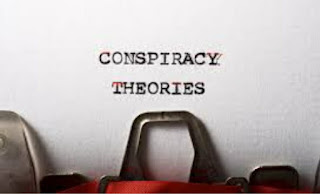Conspiracy Theories - Faith or Reason?
"The main thing that I learned about conspiracy theory, is that conspiracy theorists believe in a conspiracy because that is more comforting."
- Alan Moore
A portrayal of a situation or event that invokes a conspiracy by powerful groups, often political in nature, can be termed as conspiracy theories. When such groups constantly reinstate a certain direction of thought, your mind tends to take the other direction, sometimes. When people around the globe begin believing it, it becomes a conspiracy theory.
Conspiracy theories have a higher effect in a period of war or economic depression. This thinking is brought by a strong human desire which is important and self relevant.
Conspiracy beliefs result from a range of psychological, political, and social factors, most of which exist inside people's heads.
Conspiracy theories are explanations for events or situations. They are often connoted negatively. It basically answers the question “What might have happened instead of what people lead us to believe?”
Types of Conspiracy Theories:
A conspiracy theory can be local or international. It can be universally agreed or declined. If we break them down we can classify them as follows:
● The theories based on figures or persons working against a particular firm or organization from the outside.
● The theories which explain how the people with a firm or organization are working against it.
● Where powerful people are manipulating events for selfish gains.
● Where lower classes of people are working against the social order.
● The theory which suggests good sources helping people from behind the scenes.
● Theories explaining the workings of events that are limited and well defined.
● Conspiracy theories that believe that a single organization is planning to take over the world.
These theories sometimes have little to no evidence to them. Although proof for or against them, results in the theory gaining relevance. Faith, not proof, is often the one factor driving such theories.
The conspiracy that maybe the reason conspiracy theories exist is to cover up a much larger plot line in play is a conspiracy theory in itself.
Consequences of Conspiracy Theories:
These theories often lead to larger world problems like genocide, prejudice, and wars.
Is the Bermuda Triangle real? Were Crop Circles really made by aliens?
Such conspiracy theories are hilarious to us common folks, almost laughable. Believers of such theories are considered equivalent to village fools.
Yes, a good old conspiracy theory just acts as brain fodder. However, have we ever pondered upon the impacts of such information being available in the public domain? How it impacts us as an individual, or society as a whole?
According to research conducted by The New York Times, people exposed to anti - government conspiracies are less likely to vote.
A similar case can be observed surrounding our COVID vaccine. It is no surprise that the vaccine has been met with mixed responses, considering that it was produced in a fraction of the duration required to formulate a vaccine. This has hence encouraged portions of the public to refrain from taking this vaccine.
In these cases the public opinion was affected negatively, since it leaves a psychological impact on a person's mind, which makes them believe they are powerless.
Yes, healthy skepticism is important for society as a whole to function. It leaves our providers and governments on their toes.
However, how do we as a whole deal with conspiracy theories that are dangerously subversive, and threaten our social systems with inaction?
The question remains... Why are humans so attracted to conspiracy theories?
Theories can be found everywhere as long as even one person believes it to be true. They don't care much about the sensitivity of the particular situation or the people involved in it. They simply spring up.




Comments
Post a Comment